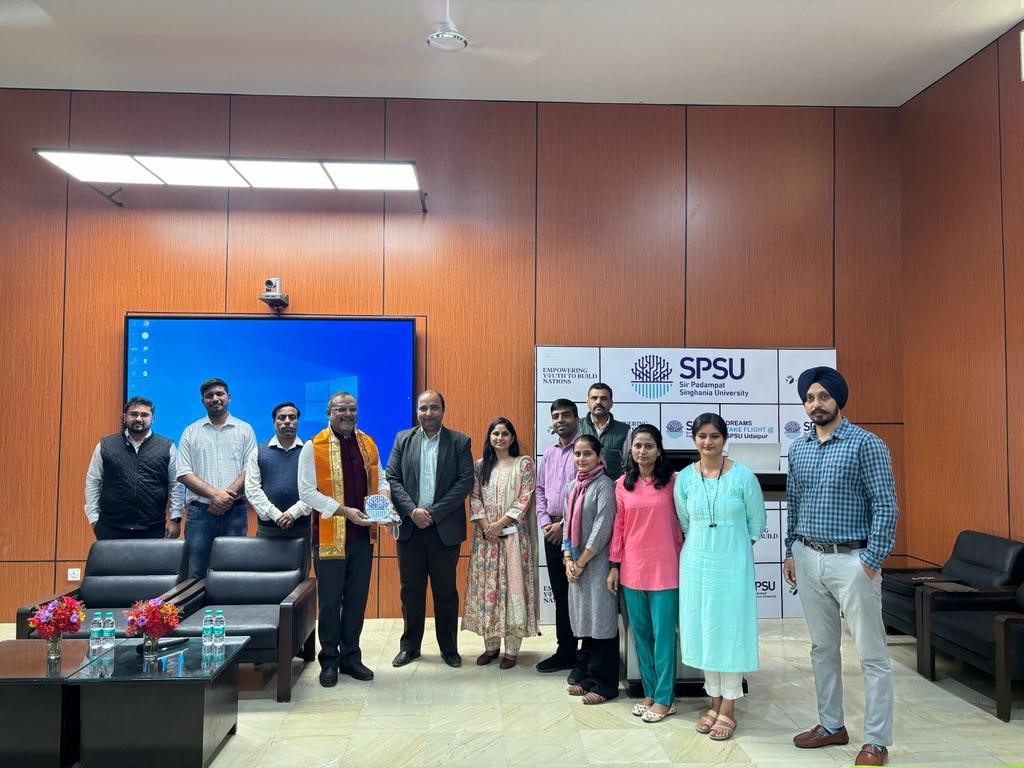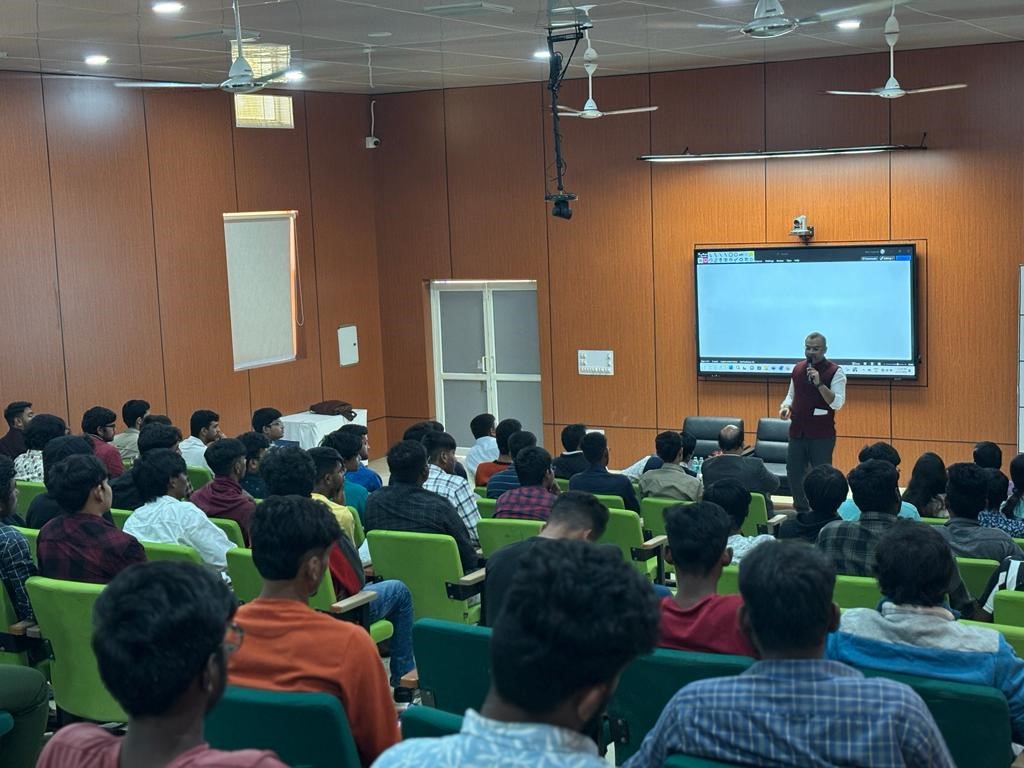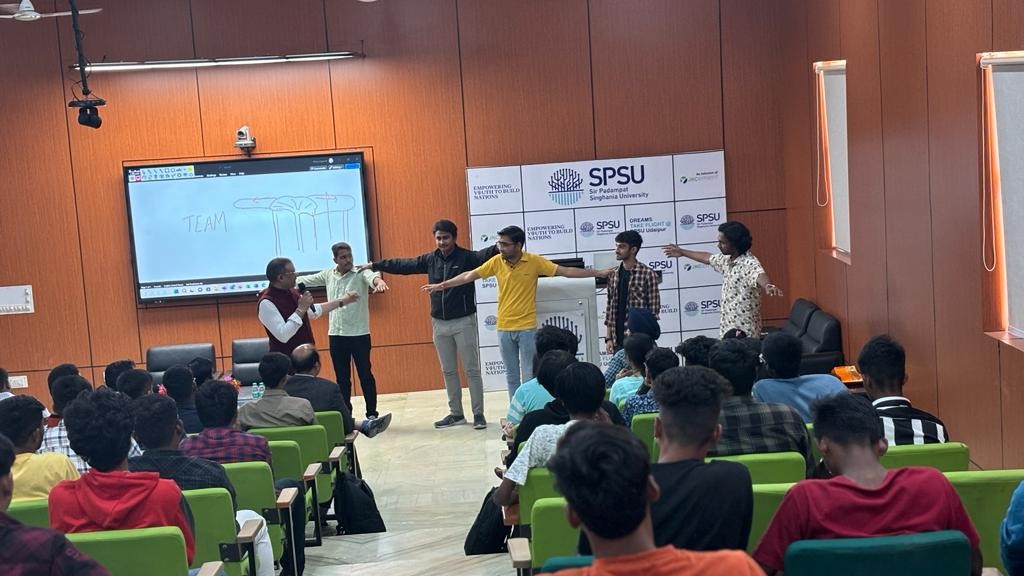Expert Lecture Report: Agile Masterclass by Xebia Academy
By: SPSU
Date : November 17, 2023
The expert lecture on Agile methodologies was conducted on 17 November 2023 at LT-2,
SPSU by our expert Mr.Manu Aggarwal from Xebia Academy. The lecture aimed to provide
participants with a comprehensive understanding of Agile principles, practices, and their
applications in modern project management. The guest was honoured by Prof. (Dr). Darpan
Anand, Head Department of Computer Science & Engineering, SPSU along with senior
professors. Total 130 students participated in this session where the practical aspects of the
project management was also illustrated through various activities.
The session was delivered by Mr. Manu Aggarwal a seasoned Agile practitioner with more than 10 years of experience in implementing Agile methodologies across diverse industries Manu serves as an Enterprise Transformation Coach and agile enabler with a wealth of experience. Holding the title of SAFe Program Consultant (SPC since 2016), he possesses expertise in consulting, training, mentoring, facilitation, assessments, transformations, and coaching. Proficient in Agile project management tools like TFS, JIRA, and Azure DevOps, Manu has implemented SAFe across various levels in these tools for Agile Release Trains (ARTs). His extensive background includes training and coaching over 4000 individuals in Agile methodologies and 400-plus individuals in SAFe across multiple organizations. Manu's training repertoire covers all SAFe courses, including RTE, SAFe Agilist, POPM, SAFe 4 Teams, SAFe for DevOps, SAFe for Scrum Master, and Advanced Scrum Master. He aligns his coaching style (Shu-Ha-Ri) with the Tuckman Model (Forming, Storming, Norming, and Performing), seamlessly transitioning from teaching and handholding to mastery while contextualizing processes to individual needs.
The topics covered were: Introduction to Agile, Key Agile Frameworks, Agile Roles and Responsibilities, Agile Tools and Technologies, Scaling Agile and Case Studies and Success Stories that included Real-world examples of successful Agile implementations.
The lecture included interactive sessions where participants actively engaged in discussions, Q&A sessions, and group activities. Mr. Manu encouraged participants to share their experiences and challenges, fostering a collaborative learning environment.
The Agile Masterclass provided participants with a solid foundation in Agile methodologies, equipping them with the knowledge and tools necessary to implement Agile practices in their respective work environments. The session concluded with a call to action, encouraging participants to apply Agile principles in their projects and share their experiences with the Agile community. Agile Project Management is an iterative and flexible approach to project management that emphasizes collaboration, adaptability to change, and customer satisfaction. It contrasts with traditional project management methodologies, such as Waterfall, which follow a linear and sequential process. Agile is particularly well-suited for projects where requirements are expected to change or are not well-defined at the beginning of the development process. Key principles and practices of Agile Project Management discussed in this session include:
Iterative and Incremental Development: Agile projects are divided into small increments with minimal planning, and changes can be made as the project progresses. This allows for quick adaptation to changing requirements and feedback from stakeholders.
Customer Collaboration: Agile places a strong emphasis on collaboration with customers and stakeholders throughout the project. Regular feedback is sought and incorporated to ensure that the project aligns with customer needs.
Adaptive Planning: Agile doesn't require a detailed project plan upfront. Instead, planning is done incrementally and adaptively as the project unfolds. This allows teams to respond to changing priorities and requirements.
Cross-Functional Teams: Agile teams are typically cross-functional, consisting of members with diverse skills and expertise necessary to complete the project. This helps in fostering collaboration and reducing dependencies.
Continuous Delivery: Agile encourages delivering a potentially shippable product at the end of each iteration or sprint. This allows for early and regular delivery of valuable features and improvements.
Embracing Change: Agile acknowledges that requirements may change, and the project should be flexible enough to accommodate these changes. Changes are viewed as opportunities for improvement rather than disruptions.
Daily Stand-up Meetings: Agile teams often conduct short, daily stand-up meetings to discuss progress, challenges, and plans. This promotes communication and helps identify and address issues quickly.
Retrospectives: After each iteration, teams hold retrospectives to reflect on what went well, what could be improved, and how to implement those improvements in the next iteration.
Popular Agile frameworks include Scrum, Kanban, and Extreme Programming (XP). Scrum, for instance, is one of the most widely used Agile frameworks and defines specific roles, events, and artifacts within its structure. Agile is widely used in software development, but its principles have been applied successfully in various industries, including marketing, product development, and even non-project-oriented work. It provides a flexible and collaborative approach that can enhance the efficiency and effectiveness of project delivery.
Picture of the Event:
The session was delivered by Mr. Manu Aggarwal a seasoned Agile practitioner with more than 10 years of experience in implementing Agile methodologies across diverse industries Manu serves as an Enterprise Transformation Coach and agile enabler with a wealth of experience. Holding the title of SAFe Program Consultant (SPC since 2016), he possesses expertise in consulting, training, mentoring, facilitation, assessments, transformations, and coaching. Proficient in Agile project management tools like TFS, JIRA, and Azure DevOps, Manu has implemented SAFe across various levels in these tools for Agile Release Trains (ARTs). His extensive background includes training and coaching over 4000 individuals in Agile methodologies and 400-plus individuals in SAFe across multiple organizations. Manu's training repertoire covers all SAFe courses, including RTE, SAFe Agilist, POPM, SAFe 4 Teams, SAFe for DevOps, SAFe for Scrum Master, and Advanced Scrum Master. He aligns his coaching style (Shu-Ha-Ri) with the Tuckman Model (Forming, Storming, Norming, and Performing), seamlessly transitioning from teaching and handholding to mastery while contextualizing processes to individual needs.
The topics covered were: Introduction to Agile, Key Agile Frameworks, Agile Roles and Responsibilities, Agile Tools and Technologies, Scaling Agile and Case Studies and Success Stories that included Real-world examples of successful Agile implementations.
The lecture included interactive sessions where participants actively engaged in discussions, Q&A sessions, and group activities. Mr. Manu encouraged participants to share their experiences and challenges, fostering a collaborative learning environment.
The Agile Masterclass provided participants with a solid foundation in Agile methodologies, equipping them with the knowledge and tools necessary to implement Agile practices in their respective work environments. The session concluded with a call to action, encouraging participants to apply Agile principles in their projects and share their experiences with the Agile community. Agile Project Management is an iterative and flexible approach to project management that emphasizes collaboration, adaptability to change, and customer satisfaction. It contrasts with traditional project management methodologies, such as Waterfall, which follow a linear and sequential process. Agile is particularly well-suited for projects where requirements are expected to change or are not well-defined at the beginning of the development process. Key principles and practices of Agile Project Management discussed in this session include:
Iterative and Incremental Development: Agile projects are divided into small increments with minimal planning, and changes can be made as the project progresses. This allows for quick adaptation to changing requirements and feedback from stakeholders.
Customer Collaboration: Agile places a strong emphasis on collaboration with customers and stakeholders throughout the project. Regular feedback is sought and incorporated to ensure that the project aligns with customer needs.
Adaptive Planning: Agile doesn't require a detailed project plan upfront. Instead, planning is done incrementally and adaptively as the project unfolds. This allows teams to respond to changing priorities and requirements.
Cross-Functional Teams: Agile teams are typically cross-functional, consisting of members with diverse skills and expertise necessary to complete the project. This helps in fostering collaboration and reducing dependencies.
Continuous Delivery: Agile encourages delivering a potentially shippable product at the end of each iteration or sprint. This allows for early and regular delivery of valuable features and improvements.
Embracing Change: Agile acknowledges that requirements may change, and the project should be flexible enough to accommodate these changes. Changes are viewed as opportunities for improvement rather than disruptions.
Daily Stand-up Meetings: Agile teams often conduct short, daily stand-up meetings to discuss progress, challenges, and plans. This promotes communication and helps identify and address issues quickly.
Retrospectives: After each iteration, teams hold retrospectives to reflect on what went well, what could be improved, and how to implement those improvements in the next iteration.
Popular Agile frameworks include Scrum, Kanban, and Extreme Programming (XP). Scrum, for instance, is one of the most widely used Agile frameworks and defines specific roles, events, and artifacts within its structure. Agile is widely used in software development, but its principles have been applied successfully in various industries, including marketing, product development, and even non-project-oriented work. It provides a flexible and collaborative approach that can enhance the efficiency and effectiveness of project delivery.
Picture of the Event:





